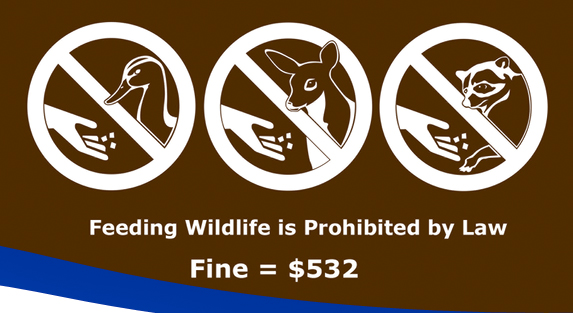Metro Parks Tacoma has expanded efforts this summer to educate park users about the law prohibiting the feeding of birds and animals, and the health and safety risks illegal feeding can create for the public and wildlife.
“This is a chronic problem that endangers wildlife and results in costly consequences for our community. We are placing an emphasis on public education about why the law prohibits feeding,” said park superintendent Marina Becker. “We are optimistic that once educated about the issue, those who care about wildlife and the well-being of our community will quit feeding birds and animals.”
Visitors to Point Defiance and Wapato Park will notice more regulatory signs — both permanent and portable/temporary — highlighting just a few of the reasons why feeding is illegal. Park staff will work to distribute more than 5,000 informational cards to park visitors to help raise awareness.
As a last resort to curb this issue, off-duty officers will conduct a limited number of focused patrols throughout the summer, beginning mid-July. Violation of Tacoma Municipal Code 8.27.130, which prohibits the feeding wildlife, carries a penalty of $532.
Feeding is not only potentially harmful to wildlife; it can also lead to significant health and safety risks for humans and domesticated pets as well, according to Metro Parks Tacoma officials. As wildlife becomes conditioned by human feedings, many species will actually alter their natural behaviors, resulting in adverse consequences.
Interactions with humans during feeding can also lead to a loss of natural instincts to retreat from people. Wildlife can actually exhibit more aggressive and territorial tendencies when conditioned to view people as a source for food, according to Metro Parks Tacoma officials.
Over the years, Metro Parks Tacoma has enlisted special services and employed a number of activities to help address overpopulation issues. In an effort to minimize human health risks, while attempting to deal humanely with overpopulation issues, the Park District modified landscapes to deter geese; utilized noise makers, lasers and decoys to encourage geese to relocate by making the area less comfortable and appealing to them; hired professional dog handlers to disperse Canada geese from parks; worked with USDA Wildlife Services to addle eggs when nests are found in parks; installed signage throughout the park system to increase awareness of the law prohibiting the feeding of wildlife; and focused park staff efforts on outreach with visitors to communicate that feeding is bad for the wildlife, has negative impacts on water quality and the environment, poses health and safety risks to humans and pets and is illegal.
More information is online here.







